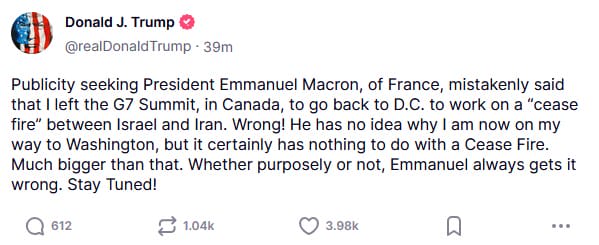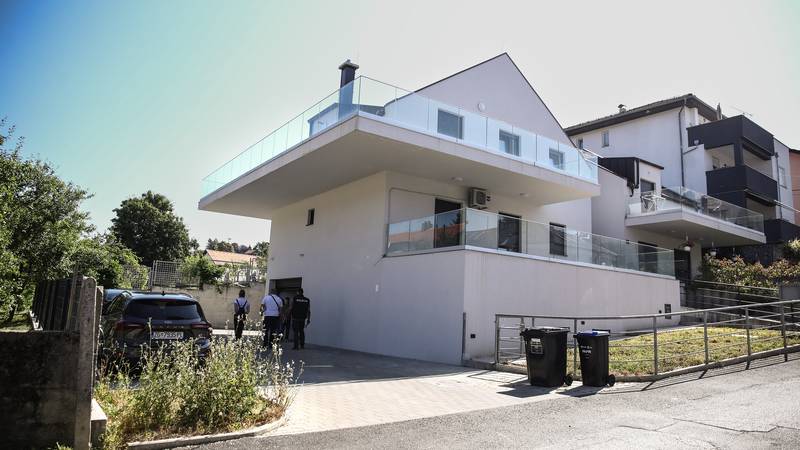Trump casts his shadow over the Australian elections
/s3/static.nrc.nl/images/gn4/stripped/data131616285-96c985.jpg|https://images.nrc.nl/QsevMzDEKtXjGhgM9r5YEeNp0LM=/1920x/filters:no_upscale()/s3/static.nrc.nl/images/gn4/stripped/data131616285-96c985.jpg|https://images.nrc.nl/HGxYcoBCkiNVZTdMDKNG-oxwG7s=/5760x/filters:no_upscale()/s3/static.nrc.nl/images/gn4/stripped/data131616285-96c985.jpg)
« You can’t scratch your nose here without being filmed from three different angles, » says Peter Dummett, general manager of the port of Darwin. It is a crystal clear morning in the top endthe northern tip of Australia. Dummett overlooks the vast asphalted terrain, except for a few containers. The sun ruthlessly reflects the calm water. « This is the strictly regulated port of the country. We have more cameras here than during a television report of the Olympic Games. »
Dummett is a jovial man in the sixties. After a career of twenty years, he ended up at the harbor. He has been in charge for thirteen years. He likes to talk about his beloved harbor and takes plenty of time to lead journalists and other interested parties around, although he first had to convince the head office. « The idea was first: if we keep quiet, all that attention will go away by itself. But I have been walking around this planet long enough to know that if you create a hole for the media, they fill it up. And not always too accurately. »
During the Australian election campaign of the past weeks, the port of Darwin was regularly in the media. That is because of the country where the head office stands: China. Since 2015, the port has been in the hands of the Shandong Landbridge Group, a company of the Chinese billionaire Ye Cheng. For more than 280 million euros, the company received the lease of the port for 99 years. Landbridge has close ties with the Chinese Communist Party and the Chinese popular liberation army.
Photo Helen Orr
That already caused criticism from people who found that national security was being endangered for economic gain. Former president Barack Obama expressed his dissatisfaction with the then Australian Prime Minister Malcolm Turnbull.
Now both the Labor government party and the Liberals, the largest opposition party, call back to buy the port after the elections. « Everyone agrees that this should never have happened, » says Jennifer Parker, safety expert at Australian National University in Canberra. « If a crisis or conflict arises in the region, we cannot afford that a Chinese company runs one of our most important strategic ports. »
Make Australia Great Again
It is just one of the examples on which geopolitics penetrates during the election campaign in Australia. In recent weeks, the country was dominated by the federal elections that take place this weekend. Although the largest parties prefer to campaign on domestic matters, such as the high costs of living, they cannot ignore the international situation. « Everyone sees that the relationship with China and the United States is at the top of the priority list of the next government, » says Michael Fullilove, director of the leading think tank Lowy Institute.
The United States has traditionally been the most important strategic partner of Australia. But with Trump in the White House, that relationship is under pressure. « The new government must be able to deal with an American president who does not believe in alliances and free trade, » says Fullilove. « And that while the United States is extremely important for our safety. »
The Australian opposition leader Peter Dutton hoped to hunt for Trumps victory
Initially, the Australian opposition leader Peter Dutton hoped to hitch a ride on Donald Trumps victory. At the start of the election campaign, the leader of the largest opposition party came up with policy plans that seemed to be one-on-one copied of the new government in the White House. For example, he wanted to appoint a minister for ‘government efficiency’, he intended to dismiss 41,000 officials and to prohibit from working from home. His candidate minister for the Australian Doge Ministerie, Jacinta Nampijinpa Price, said During a campaign meeting Even the words: « Make Australia Great Again. »
Soon the party had to get rid of it with Rasse. The plans turned out to be very unpopular, especially among women, who have difficulty binding the Liberals of Dutton anyway. Out of opinion polls – in which Labor leads – it appears that the opposition party has suffered By sitting against the ‘Strong Man’ in the White House. The party now denies that she is inspired by Trump, and states that the plans are not « ode to Donald Trump ».
The consequences of Trumps presidency can be felt in Australia. Not just because of the trading rates. During the previous Trump government, Australia came out of that, but this time it did not work. Last month, the White House announced a tax of 10 percent on all imports from the country on ‘Liberation Day’.
Nucleus
There are also concerns about the military partnership Aukus, which has become one of the most important pillars of the relationship between Australia and the United States. The Alliance was established to counterbalance the growing Chinese power in the region. Part of this is that Australia, among other things, buys nuclear powered submarines from the US, which cost hundreds of billions of Australian dollars. Nevertheless, the parties expect the US to keep that deal, even though Trump is seen as a less reliable partner.
Read also
What will the new alliance Aukus do and 8 other questions about the Anti-Chinese Alliance
« This deal is in the interest of both the US and Australia, » says Fullilove. He points out that Australia remains trapped in a complicated triangular relationship with the US and China. As is known, China is not happy with that safety pact between the United States, the United Kingdom and Australia. « It is complicated to navigate between our most important safety partner, the United States, and our most important economic partner, China on the other. »
Defense experts state that there was not enough attention during the campaign for the threat of a regional conflict. « The risk of a Third World War is realistic, » said defense specialist Paul Dibb of Australian National University in Canberra against the Australian newspaper Sydney Morning Herald. Dibb was the most important defense strategist of Australia at the end of the Cold War, and is now emeritus professor of strategic studies at the university.
Australia is currently vulnerable, he says. This is evident, among other things, from the fact that Chinese warships could sail around the country. In Australia and New Zealand went at the end of February All alarm bells off When three Chinese warships performed military exercises with sharp ammunition in the Tasmanzee. « The Soviet Union did not even do that during the peak of their power, » said Dibb.
/s3/static.nrc.nl/images/gn4/stripped/data131616228-e72dbb.jpg|https://images.nrc.nl/Yao8s07xr_x53XLUGheGQyqlRuI=/1920x/filters:no_upscale()/s3/static.nrc.nl/images/gn4/stripped/data131616228-e72dbb.jpg|https://images.nrc.nl/l9JTuqBRQq-xeg-cIDTjqG5BAl4=/5760x/filters:no_upscale()/s3/static.nrc.nl/images/gn4/stripped/data131616228-e72dbb.jpg) Entry gate of the port of the Australian Darwin, which is in the hands of the Shandong Landbridge Group, a company of the Chinese billionaire Ye Cheng.
Entry gate of the port of the Australian Darwin, which is in the hands of the Shandong Landbridge Group, a company of the Chinese billionaire Ye Cheng.
Photo Helen Orr
Parker also states that the Indo-Pacific now have the « the most risky strategic conditions since the Second World War ». A new Australian government must take China’s threat seriously, she says. « China behaves extremely aggressively. That can, with or without intent, lead to a crisis or conflict. That has direct consequences for Australian national security. »
Nevertheless, the question is whether the geopolitical situation becomes a decisive factor in the choice of the Australian population in the voting booth. « This story is not told to Australians, not by both parties, » says Parker.
American Marines
In Darwin the tensions between the superpowers, and the split in which Australia is located, seem to come together. Both the US and Australia invest hundreds of millions of euros in improving the defense infrastructure in Darwin. More than 2,500 American Marines are stationed on an Australian military base, not far from the port.
They often train together with the Australian Navy and regularly use the port, to the pleasure of former Marine Dummett. He has warm memories of his time at the Navy and is proud that his port is used so intensively. « I have been with the Navy for twenty years, I have experienced the first Gulf War together with our American allies. So I understand the unrest. But I assure you, that’s why we are the strictly controlled port of the country. »
Landbridge has unmistakably made clear that the port is not for sale. Dummett hopes that the politicians will abandon the plan quickly. « All that suspicion is especially annoying for my staff. I have a good team, we are doing a good job here. We have to focus on all the positive effects of the port for the Australian economy. »
/s3/static.nrc.nl/images/gn4/stripped/data131616243-aa8db3.jpg|https://images.nrc.nl/eltFmN2WbUc9ToOXcltlSqET34o=/1920x/filters:no_upscale()/s3/static.nrc.nl/images/gn4/stripped/data131616243-aa8db3.jpg|https://images.nrc.nl/l-MyyVW9E-w9h1UpgpiGrYpm1Ys=/5760x/filters:no_upscale()/s3/static.nrc.nl/images/gn4/stripped/data131616243-aa8db3.jpg)
Photo Helen Orr

:format(webp)/s3/static.nrc.nl/bvhw/files/2021/10/data76361741-f8a93f.jpg)
/s3/static.nrc.nl/wp-content/uploads/2025/06/17083830/web-1706BINbijCBS.jpg)
/s3/static.nrc.nl/images/gn4/data133759308-0bd2d7.jpg)
:format(webp)/s3/static.nrc.nl/wp-content/uploads/2025/06/14150800/data133577503-6b2373.jpg)




